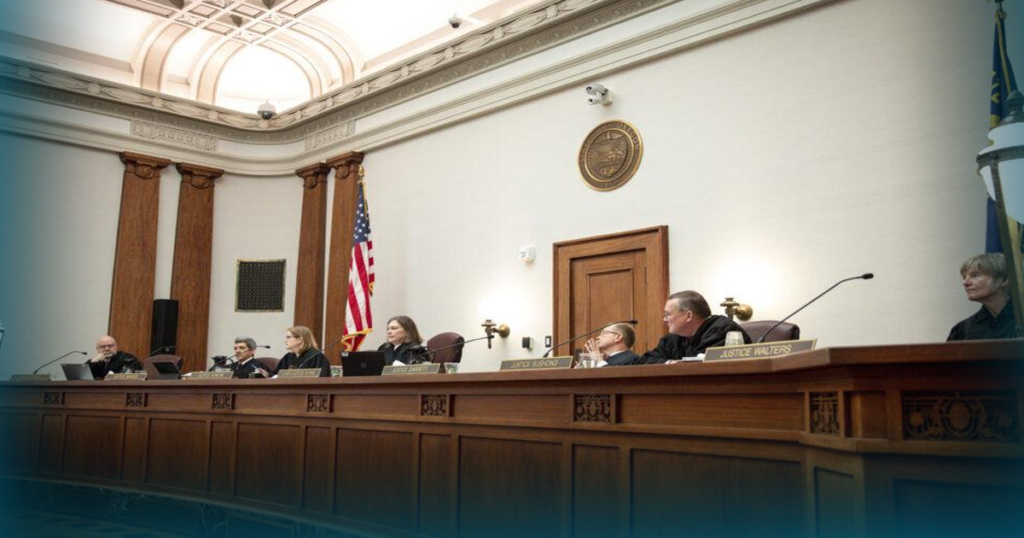The Oregon Supreme Court ruled on Thursday that ten Republican state senators who took part in a record-breaking boycott last summer in order to obstruct bills that would have expanded access to medical intervention, transgender treatment, and abortion rights for minors, as well as a separate measure regarding ghost guns, would not be eligible to run for office again this year.
Despite the plain text of the Constitution, the Oregon Senate Republican Caucus accused the Democratically stacked Supreme Court of siding with Democrats and union friends on Measure 113. Ten Republican senators, or one-third of the Oregon Senate, are effectively out of office as a result of the state high court’s ruling, the caucus emphasized.
The decision supports the declaration made by Democratic Oregon Secretary of State LaVonne Griffin-Valade last August to remove the 10 lawmakers from the ballot as part of a bill meant to prevent such boycotts. Voters approved Measure 113 in 2022, amending the state constitution to prevent legislators from being re-elected if they have more than ten unexcused absences from office.
The boycott from the previous year delayed hundreds of measures and lasted for six weeks, the longest in state history. The secretary of state’s decision prompted a lawsuit from five senators: Tim Knopp, Daniel Bonham, Suzanne Weber, Dennis Linthicum, and Lynn Findley. They were one of the ten senators from the GOP who missed more than ten votes.
It is clear that we disagree with the Oregon Supreme Court’s decision. But more significantly, Senate Republican Leader Knopp stated on Thursday, “We are extremely troubled by the chilling effect this decision will have to suppress dissent.”

I’m upset, but I can’t say that I’m shocked that a court of justices made up exclusively of governors [Tina Kotek and Kate Brown] would rule based more on political rhetoric than on their own precedent. Weber continued, Democratic politicians and their union supporters are the only winners in this situation.
Bonham Statement on Oregon Court Ruling
Regardless of political inclinations, every legal thinker I’ve spoken with has confirmed that when there is only one reading of the plain language of the law, that interpretation is definitive, continued Bonham. The Oregon Supreme Court ruled that voter intent, which cannot be assessed, takes priority over the Oregon Constitution, regardless of the document’s plain language. In a political court, there is no justice.
Based on her position, Griffin-Valade had instructed her office’s elections division to impose an administrative regulation, which led to the decision to strike the Republican MPs from the ballot.
Lawyers for the senators and the state argued about the syntax and grammar of the text added to the state constitution following Measure 113’s approval by voters during the December hearings before the Oregon Supreme Court.
A legislator cannot run “for the term after the election after the member’s current term is completed,” according to the legislation. Given that elections are held in November and a senator’s tenure ends in January, the senators argued that the amendment allowed them to run for office again. They contend that the punishment doesn’t start working right away but later after they’ve completed another term.
The small phrasing variations between the measure’s text as it appeared in the voters’ brochure and the ballot that voters actually filled out also caused friction between the two parties.
If the legislation is approved, lawmakers with ten or more unexcused absences will not be allowed to hold office for the “period following current term of office.” The wording of the bill that was printed in the brochure contained the phrase “election,” but it was absent from this version. In the end, the pamphlet’s contents were included into the state constitution.
The state contended that voters who voted “yes” on the proposal meant to ban legislators with that many absences from serving again once their current term expired.
Before candidates wishing to run in this year’s election must file by March 20, 2024, all parties involved in the suit had requested clarification on the matter.
Following Republican walkouts in the Legislature in 2019, 2020, and 2021, Measure 113 was adopted by Oregon voters by a sizable margin, according to The Associated Press.
After Democrats made compromises on a broad bill that expanded access to abortion for kids, transgender procedures, and medical intervention—a measure that Republicans considered excessive and a threat to parental rights—the 2023 walkout, which had paralyzed the state legislature for weeks, came to an end.
The original proposal would have freed medical professionals to perform abortions on any patient, regardless of age, and in some circumstances would have spared them from informing the patient’s parents.
Democrats agreed to amend the language about parental notifications for abortion in exchange for ending the strike. Under the compromise, a doctor would not be required to notify the parents of a patient under the age of 15 if they feel that doing so would not be in their best interest. However, a second provider would need to agree. But if consulting a parent or guardian would result in the patient being abused or neglected, then no second opinion would be required.
Democrats said that the law will still guarantee access to abortion and shield caregivers from state-passed restrictions on sex reassignment or abortion. In order to address gender dysphoria, it will also be necessary for health insurance to pay for “medically necessary” sex reassignment treatments.
Democrats also consented to removing a number of modifications from a bill that would have penalized the production or transfer of weapons that are undetectable. The since-removed provisions would have expanded the age at which semiautomatic guns may be purchased from 18 to 21 and imposed stricter regulations on concealed carry.
Also Read: The US House Passes a Bill to Restore Company Tax Advantages and Increase the Child Tax Credit


Leave a Reply